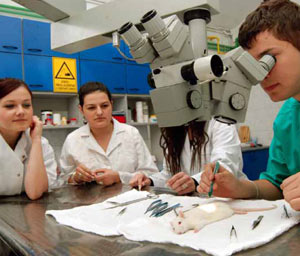Teaching method and learning system
The Faculty of Medicine has been in charge of promoting the educational and academic excellence during the training of competitive graduates for the European market who are able to adapt themselves to the demands of the current labour market and the different healthcare systems. At the end of the six-year degree programme, students will need to take a final exam in order to choose a laboratory residence, a clinical speciality or scientific research by means of Postgraduate or PhD programmes.
From the beginning, the main challenge of the Faculty of Medicine in Cluj-Napoca has been to combine innovation in biomedical sciences with human education, being this a society and health-oriented objective. Furthermore, the University has always tried to follow the guidelines of scientific professionalism and the essential connection with the human being. Thus, the Faculty has gained throughout the years a sound educational basis represented by its valuable teaching staff and a specific quality structure.

Thanks to its own efforts and some funding programmes such as Tempus, Phare, World Bank, etc., the Faculty has been able to develop their own qualified human resources and a progressive restructuring of its academic programme. Due to this process, the Faculty now has a young and professional teaching staff and an academic programme adapted to the current needs. Therefore, it totally meets the European requirements. Teaching methods have also improved, but they still keep the essence of the Faculty, i.e., the practical side of teaching.
The development undertaken in the last years includes the reinforcement of material facilities for a fundamental education and the expansion of the teaching area concerning clinical training. This has been possible thanks to the addition of new sections to the university hospital, as well as a syllabus with new indispensable subjects for a modern training (methodology of scientific research, medical bioethics, medical communication, behavioural sciences, etc.)

Regarding academic development, the new subjects have not been the only change, but the number of hours established for some courses has also been modified according to nowadays needs. This way, clinical subjects and basic subjects are now more balanced. Cell and Molecular Biology, Medical Genetics, Biochemistry and Integrated Psychology have special importance during the first and second year. On the contrary, some clinical subjects like Pathology and Pharmacology have been moved to higher years, while Radiology and Clinical Imaging are taught together with Anatomy, Internal Medicine and Surgery. In the first year, a First Aid course has been added, so the students can be in contact with clinical medicine as soon as possible.
Bologna Process has also been adopted and applied together with the ECTS system. The certificates issued by the Iuliu Hatienagu University are therefore recognized in all Europe. Apart from a degree programme in Romanian, the Faculty has been offering programmes in English and French addressed to international students for more than 10 years. Since their implementation, the Univesity has welcomed a large number of students coming from more than 25 different countries. The management of the Faculty has defined their strategic objectives, which are focused on the adaptation to modern medicine through academic development. As a result of that, several projects which support the academic reform and the development of a medical education based on the student needs have been carried out.
The quality of the education services of this Faculty can be proved through the success achieved by its graduates at last year’s national residency examinations, as well as in the easy adaptation of young specialists regarding the demands of European clinics and those from other continents.






